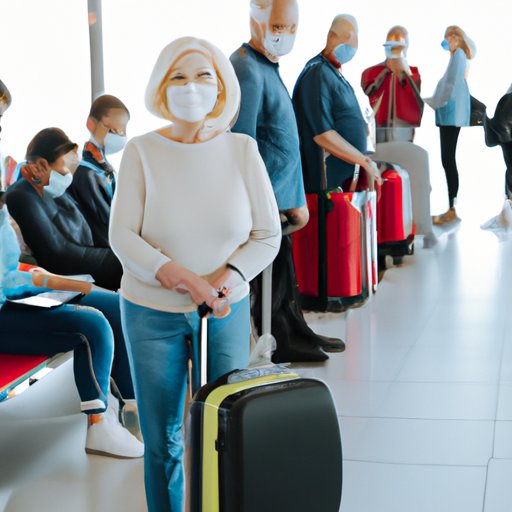Introduction
With the world still grappling with the COVID-19 pandemic, travel restrictions have become a reality for many. The impact has been felt not only by travelers but also by the tourism industry, with businesses struggling to stay afloat amidst the uncertainty. As vaccination efforts continue and new variants emerge, the question on many people’s minds is: will there be travel restrictions again? In this article, we explore this question and what travelers and the tourism industry can expect.
Preparing for the worst: How to be ready if travel restrictions are reinstated
While it’s impossible to predict with certainty whether travel restrictions will be reinstated in the future, being prepared can help ease the impact. Here are some practical tips for travelers:
- Book refundable reservations whenever possible. This will allow you to cancel or reschedule your trip without penalty if necessary.
- Have a backup plan for alternative destinations. This can help you avoid losing out on time and money invested in planning a trip that may not be feasible.
- Pay attention to updated travel advisories and guidelines from reliable sources such as the World Health Organization (WHO) or the Centers for Disease Control and Prevention (CDC).
Staying informed and taking proactive steps can help mitigate the impact of travel restrictions on your travel plans.
The potential impact of renewed travel restrictions on the tourism industry
The impact of renewed travel restrictions would likely be felt throughout the tourism industry, affecting everything from airlines and hotels to local attractions and travel agencies. For example:
- Airlines may face decreased demand and reduced revenue, potentially leading to job losses and route cancellations.
- Hotels and other accommodations may struggle to fill rooms, leading to potential closures.
- Popular tourist attractions may see a sharp drop in visitors, threatening jobs and businesses.
Long-term effects could include decreased tourism revenue, economic instability, and job losses. The industry has already been hit hard by the pandemic, and renewed travel restrictions would only exacerbate the situation.
Learning from history: When and why travel restrictions have been reinstated in the past
Travel restrictions have been implemented in the past in response to pandemics, natural disasters, and political events. For example:
- During the 2003 SARS outbreak, travel restrictions were implemented in many affected countries to prevent the spread of the virus.
- Following the 2010 eruption of the Eyjafjallajökull volcano in Iceland, air travel was restricted throughout Europe due to the risk of volcanic ash interfering with aircraft engines.
- Following the 9/11 terrorist attacks, the U.S. implemented strict travel restrictions, including a temporary ban on international flights and increased security measures at airports.
These examples illustrate how travel restrictions have been implemented in the past to protect public health and safety, with varying degrees of success.
What experts are saying about the future of travel restrictions
At this point, the future of travel restrictions remains uncertain. However, experts have offered differing opinions on the likelihood of restrictions being reinstated. Some factors that could influence these decisions include:
- The spread of new variants, some of which are more contagious or resistant to current vaccines.
- Vaccination rates and effectiveness in different countries
- Political considerations, such as diplomatic tensions or national security concerns.
Despite these factors, there is no clear consensus among experts on whether travel restrictions will be reinstated, and if so, to what extent.
The pros and cons of travel restrictions: A debate
Debate rages among experts and advocates regarding the pros and cons of travel restrictions. Some argue that restrictions are necessary to protect public health and prevent the spread of disease, while others contend that they do more harm than good. Here are some key arguments from both sides:
Arguments for travel restrictions:
- Travel restrictions can help prevent the spread of disease and protect public health.
- Restricting travel can give healthcare systems time to respond and prepare for potential outbreaks.
- Travel restrictions can alleviate the burden on healthcare systems and help prevent shortages of medical supplies.
Arguments against travel restrictions:
- Travel restrictions can have a negative impact on the economy, including the tourism industry and international trade.
- Restrictions can limit access to essential goods and services, including medical supplies and humanitarian aid.
- Travel restrictions can have unintended consequences, such as causing panic or discrimination against affected populations.
Both sides of the debate recognize the complexity of the issue and the need for careful consideration before implementing travel restrictions.
Conclusion
While the future of travel restrictions remains uncertain, it’s important to be informed and prepared for the possibility. Understanding the potential impact on travelers and the tourism industry can help us better mitigate the effects, and learning from history can offer valuable insights. Experts’ opinions vary on the likelihood and efficacy of travel restrictions, and a debate over their pros and cons continues. Ultimately, staying informed, taking precautions, and being prepared can help us navigate this uncertain time.
(Note: Is this article not meeting your expectations? Do you have knowledge or insights to share? Unlock new opportunities and expand your reach by joining our authors team. Click Registration to join us and share your expertise with our readers.)
